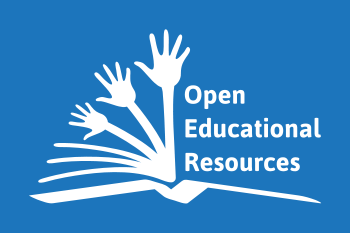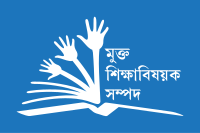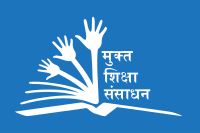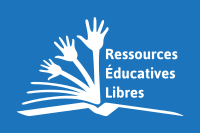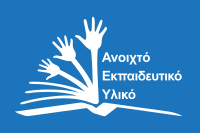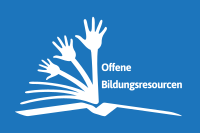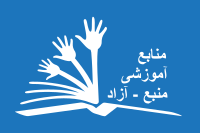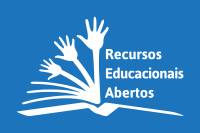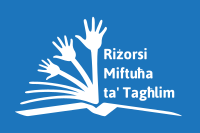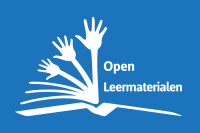UNESCO OER logo translations
|
Contents
Bangla / Bengali
Suggestions and comments
- অবারিত শিক্ষাগত সম্পদ (Submitted by Prof. Supten Sarbadhikari)
Consensus proposal
Hindi
Suggestions and comments
- अप्रतिबंधित शैक्षिक संसाधनों (Submitted by Prof. Supten Sarbadhikari)
- मुक्त शिक्षण संसाधन (Mukta ShikshaN sansadhan) (Submitted by Nagarjuna: I checked with our translation who suggested this alternative)
- He suggested to use it for both plural as well as singualar, unless the emphasis is required depending on the context. (Submitted by Nagarjuna)
- अप्रतिबंधित means "unrestricted". There are restrictions of attribution and share alike, and so this expression is not suitable. 'Mukta' translates also to libre, the french term used for free as well as open. (Submitted by Nagarjuna)
- Yes, "मुक्त" (Hindi / Sanskrit) is indeed a good translation for "Open" Supten 07:13, 27 February 2012 (UTC)
- मुक्त शिक्षा संसाधन. I think the use of the term शिक्षा is better. शिक्षण can be used in Marathi. Kalpana --Kalpana Gupte 07:33, 27 February 2012 (UTC)
- I too second Hindi translation "Mukta Shikshan Sansadhan मुक्त शिक्षण संसाधन"... Even while reading posts, I thought of the same translation. (Submitted by J Shinde)
- मुक्त शिक्षा संसाधन is appropriate --Ravi limaye 16:11, 27 February 2012 (UTC)
- Which word is best for "libre"? - valuing freedom over openness (valuing both) - difference explained. - Kim Tucker 17:21, 27 February 2012 (UTC)
- i believe that मुक्त would be an appropriate word. --Kalpana Gupte 05:16, 29 February 2012 (UTC)
Consensus proposal
Sinhala (Sinhalese)
Suggestions and comments
- Vivurtha Adyapanika Sampath (The word "Sampath" describes a very valuable resource such as gems or gold. Generally, "Vivurtha Adyapanika Sampath" describes OER as a very valuable open resource for education)--Ishansa 07:52, 27 February 2012 (UTC)
- Add comments here
Consensus proposal
- List consensus proposal here
Vivurtha Adyapanika Sampath
"Vivurtha Adyapanika Sampath" should be written using Sinhalese script as follows. The Logo needs to change accordingly. --Ishansa 01:36, 27 March 2012 (UTC)
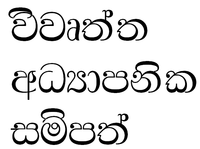
Thank you very much Ishan Sudeera Abeywardena! Please check the updated version with your essential input --Jonathasmello 09:14, 27 March 2012 (UTC)
Version française - French version
Suggestions and comments
- Ressources Educatives Ouvertes (REO)
- Ressources Educatives Libres (REL)
- Ressources Éducatives Libres (Le E doit normalement prendre un accent aigu - É) (REL) Jtouzi 11:21, 27 February 2012 (UTC)
- -1 - I am not in favour of using the word "libre" for "open" in this context (see Say libre). The OER community includes people and institutions using non-libre resources (e.g. licensed under CC-BY-NC-SA, etc.). "Ouvertes" above looks correct to me. See also this page for a work in progress on the wording of the libre emblem -- Kim Tucker 16:06, 27 February 2012 (UTC)
- The word Ouvert does not have the same meaning in French and English. Ouvert is generally used when talking about concrete things. e.g. bouche ouverte (open mouth), porte ouverte (open door). Jtouzi 17:36, 7 March 2012 (UTC)
- I am sure you mean well, and it would be great if all OER were libre (i.e free as in freedom, conforming to the free/libre cultural works definition or the libre knowledge definition) and all were available in free/libre/open file formats, accessible and editable with Libre software, etc.
- But in the "Global OER" community, they're not all libre. ND and NC restrictions are easy to find within the Global OER community and many institutions require their students to use non-libre/proprietary software to access their OER. Hence, again (imo) the label closest to the factual current reality of the global OER community in French is "Ressources Éducatives Ouvertes".
- This does not mean "Ressources Éducatives Libres" should never be used. For example, it would be fine in cases where the OER are licenced CC-BY-SA or CC-BY with (at least a link to) a version in a Free file format[1], but not when they have an NC or ND restriction (or both) and/or are in a proprietary format requiring use of non-libre software to access/edit, etc.[2]. - Kim Tucker 22:18, 24 March 2012 (UTC)
- If you support the cause of Libre knowledge[3] and by implication "Ressources Éducatives Libres", then to avoid confusion I recommend placing this label ("Ressources Éducatives Libres" or perhaps French for "libre learning resources") on a different logo[4] (i.e. not the open book with open hands[5]) and reserving the new logo for libre resources (those for which all the essential freedoms apply[6]).- Kim Tucker 22:57, 25 March 2012 (UTC)
- The following Wikipedia page in French looks relevant and might help the discussion: Licence libre. - Kim Tucker 11:49, 26 March 2012 (UTC)
- The word Ouvert does not have the same meaning in French and English. Ouvert is generally used when talking about concrete things. e.g. bouche ouverte (open mouth), porte ouverte (open door). Jtouzi 17:36, 7 March 2012 (UTC)
- -1 - I am not in favour of using the word "libre" for "open" in this context (see Say libre). The OER community includes people and institutions using non-libre resources (e.g. licensed under CC-BY-NC-SA, etc.). "Ouvertes" above looks correct to me. See also this page for a work in progress on the wording of the libre emblem -- Kim Tucker 16:06, 27 February 2012 (UTC)
Here "ouverte" does not mean anything. We only use ouverte for concrete thing like doors so "libre" is for me the only option. "Libre" in French has also the meaning of free of charge and we should us it here in my opinion. I understand the problem of not having a proper translation of open in French but we simply do not use open/ouverte for abstract stuff so for French speaking people "ressources educatives ouvertes" will sound really weird.
- What about "discussion ouverte"? A discussion is not concrete. In the context of digital resources, "libre" in French does have some special connotations (e.g. logiciel libre, œuvres culturelles libres and Licence libre). The global OER community cannot be described as "libre" as many associated institutions do not use libre licences for their OER and some of their OER are not accessible with logiciel libre. In my opinion, "Ressources Éducatives Libres" should be used on a different logo specifically for learning resources which are truly "libre" (free as in freedom, using libre licences) and not for a global OER logo. - Kim Tucker 12:16, 29 March 2012 (UTC)
Consensus proposal
- Ressources Éducatives Libres (REL) Jtouzi 11:21, 27 February 2012 (UTC)
Greek
Suggestions and comments
- Ανοιχτό Εκπαιδευτικό Υλικό (open educational resources) OR
- Εκπαιδευτικό Υλικό Ανοιχτής Πρόσβασης (open access educational resources) (both submitted by Dr. Vassilis Protonotarios)
- Comment: The second translation makes more sense in Greek, as it is more descriptive; however, I believe that both translations are correct and meaningful.
Consensus proposal
- List consensus proposal here
Ανοιχτό Εκπαιδευτικό Υλικό
German
Suggestions and comments
- Offene Bildungsresourcen (Submitted by Ulf-Daniel Ehlers)
- Add comments here
Consensus proposal
- List consensus proposal here
Persian
Suggestions and comments
- MANABEA AMOUZESHI MANBAA - AZAD =منابع آموزشی منبع - آزاد
(Submitted by Farideh Mashayekh)
- Add comments here
Consensus proposal
- List consensus proposal here
Brasil
Malayalam മലയാളം
Suggestions and comments
I would like to translate this to malayalam which is my native tongue
.It can be translated as സ്വതന്ത്ര വിദ്യാഭ്യാസ വിഭവങ്ങള് , because
here we use സ്വതന്ത്ര (which also means free or libre ) for
translating the term "open" used in "Open Source Software" and this is
the word used in the Kerala Government's School textbooks on
Information Technology developed for high school students (Submitted by Balqis Thaahaveettil )
- What about using the word അനാവൃത ( Anavruta) instead of Swatantra ?--PRAMOD KUMAR T.K. 11:07, 23 March 2012 (UTC)
Because It will be difficult to translate Free and Open Source Soft Ware(FOSS) if we use same word for both free and open.--PRAMOD KUMAR T.K. 05:06, 25 March 2012 (UTC) I request you that it would be better if you could check the Hindi and French translations .Above all The Government of Kerala has accepted this meaning for "Open " and is widely used here in this state officially .The term "Mukt" of Hindi translation too coincides with "Swathanthra" as in "Open and Free" .Hope you would provide the details of the term "anaavrutha" too.This word( അനാവൃത )doesn't seem to be as inclusive as the other (സ്വതന്ത്ര) as the former just denotes the uncovering or openness while the latter is more inclusive and is in use by the Government of Kerala too.To be more true to its derivatives, I suppose Libre /Freedom must be inclusive in the Translations So just uncovering /open as the term meaning for Anaavrutha wouldn't do justice to the term Freedom / Libre /Open as in സ്വതന്ത്ര . Balqis Thaahaveettil 22:35, 25 March 2012 (UTC)
- Please read carefully the discussion above for French. A similar issue seems to apply here(?). "Libre" (free as in freedom) does not include OER licensed with NC or ND restrictions. There are many institutions in the global OER community using such licences. The label "libre" should not be used to refer to them. It would be good to identify the Malayalam word for "libre" and make a separate logo[4] specially for those resources which really are libre[6]. Thanks - Kim Tucker 23:53, 25 March 2012 (UTC)
- You are welcome , Kim Tucker .I have not found this translation for open here by my own .I could understand your point but this is the word used for Open when it comes to be more abstract than concrete.It is the word used in the text books of IT provided by the government of Kerala through out the Secondary Schools.I agree with you but it would be as if using two different terms as such when one is already in vogue .Open as in open learning is translated by the leading regional news papers as സ്വതന്ത്ര.I hope that things will be more approachable to common people in this way as they use it as the standard form through out the state .Thanks for the clarification .--Balqis_Thaahaveettil 19:20, 26 March 2012 (UTC)
Any word which is used in another context will have different meaning. e.g. Open door cannot be Swatantra Vatil or Mukta Vatil It can be 'turanna vatil'. Hence the translation of word 'open' as used in 'Open and Distance Education' by any govt agency or Press cannot be any justification for using the same in the OER context. Anavruta suggested is one option which simply means 'open' or uncovered. Issue raised by Mr. Kim is valid here and we need to debate this and finally reach to a consensus.--PRAMOD KUMAR T.K. 03:47, 27 March 2012 (UTC)
- I appreciate and respect Kim's points but this language has already started using the term Swathanthra widely.And throughout the educational system,the term 'Swathanthra' is used to translate 'Open Degrees and 'Open Courses ' approved by all most all the universities in this State . A word remains valid in its complete meaning as long as it is used by the authentic authorities and speakers of that language .As long as the State government and Press uses it in this similar context ,it will be useless to apply another term to the same existing things ! Moreover ,the term Anavrutha too can be of no difference if used in the same context as you have exemplified Swathanthra."Anaavrutha vaatil" wont give the same sense as 'thuranna vaatil' and 'thuraana vaatil' is not as deep as 'Mukta vaatil' and using Open door as a word here to replace or translate doesn't give any sense of the deeper sense that 'Open Education' advocates.Word by word translation of this term would lead to great blunders instead.So I hope you could get my point .. --Balqis Thaahaveettil 20:24, 5 April 2012 (UTC)
Well said Balqis. I agree with your suggestion now.--PRAMOD KUMAR T.K. 12:55, 6 April 2012 (UTC)
Consensus proposal
- List consensus proposal here
സ്വതന്ത്ര
വിദ്യാഭ്യാസ
വിഭവങ്ങള്
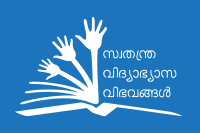
Macedonian
Suggestions and comments
Отворени образовни ресурси
Submitted by Dimitar Poposki
Consensus proposal
- List consensus proposal here
Croatian
Suggestions and comments
Otvoreni
obrazovni
sadržaji
Submitted by Tomislav Medak
Project Lead for CC Croatia
Maltese
Suggestions and comments
- Riżorsi Miftuħa ta' Tagħlim
--Anthony F. Camilleri 07:47, 16 March 2012 (UTC)
Consensus proposal
- List consensus proposal here
Dutch
Suggestions and comments
- Open leermiddelen --Robert Schuwer 20:00, 23 March 2012 (UTC)
- Open leermaterialen --Robert Schuwer 06:40, 6 April 2012 (UTC)
- Add comments here
Open moet onvertaald blijven. Alternatieven als "vrij beschikbaar" "gratis" zijn onvolledig en geven niet de 4 rechten van open weer. "Onderwijs" (bv. "open onderwijsmiddelen") is te beperkt: onderwijs is een proces waarbij geleerd wordt, maar leren kan ook zonder onderwijs. "Materialen", "Middelen", "Bronnen". Materialen is de meest exacte
Consensus proposal
Open leermaterialen --Robert Schuwer 06:44, 6 April 2012 (UTC)
Open
Leermaterialen
Hebrew
משאבי חינוך פתוחים
- Submitted by Dalit Ken-Dror, legal supervisor of the Law and Technology Clinic at the Faculty of Law, University of Haifa.
Serbian
Otvoreni Obrazovni Resursi
- Submitted by Nevenka Antic
Creative Commons Serbia Legal Project Lead https://twitter.com/#!/NenaAntic
Ukrainian
Відкриті Освітні Ресурси
- Submitted by Alona Chmilewsky--Alona 14:30, 4 May 2012 (UTC)
Відкриті Освітні Ресурси
Feedback on accessible versions
Suggestions and comments
- Here is some information from an accessibility expert at the OU (Dr Chetz Colwell) who I asked about accessibility for this logo. I've slightly edited this advice below.
- The logo includes embedded text within the graphic which means this text will not be resized under browser font size settings, and it will become pixelated when it is magnified by a screen magnifier. You can see the degradation in the page of translations: the embedded text becomes quite small and pixelated which reduces readability. Using plain text and then styling it using stylesheets might work better for some contexts.
- Suggest that ALT text version should be used which replicates the embedded text (appropriate translation or simply "Open Educational Resources"), if you want screen reader software to catch this. It is debatable whether it should include the word 'logo' - it depends on the context, for example not where the image is a link. The reader will announce the text as a 'graphic'.
- In general use it would not be appropriate for the alt text to have a long description about hands and books etc. If authors were concerned about conveying the content of the logo they could provide a link to a description elsewhere, but it should not be repeated in every use of the logo (otherwise the readers will pick this up and repeat the URL every time the logo appears).
- Its great that there is provision for derivatives to allow generation of more accessible alternatives. --ChrisPegler 10:25, 27 February 2012 (UTC)
- Appreciate this valuable feedback -- I'm sure colleagues at UNESCO will be watching this page and that working together we can achieve a more accessible outcome for all :-) --Wayne Mackintosh 10:09, 27 February 2012 (UTC)
Consensus proposal
- Consider having a version available without embedded text for use where other ways of representing this may be more accessible. [I changed the versions available in wikicommons expanding the fonts into shapes, so this point is resolved. Please let me know if you find any file still with an embedded text --Jonathasmello 13:57, 23 March 2012 (UTC) ]
- Offer advice on making this graphic more accessible [Could you please suggest a paragraph to put in the visual identity manual? --Jonathasmello 13:57, 23 March 2012 (UTC)]
- Advise that an ALT text version should be used when the OER is electronic format. [Could you please also suggest a paragraph to put in the visual identity manual? --Jonathasmello 13:57, 23 March 2012 (UTC)]
Burmese
Suggestions and comments
လွတ်လပ်လွယ်ကူစွာရနိုင်သော
ပညာရေး
အရင်းအမြစ်များ
References
- ↑ See libre cultural works definition.
- ↑ More background in Say libre.
- ↑ The vision is: Knowledge for all, freedom to learn, towards collective wisdom - Enabling communities to empower themselves with knowledge. See for example the Declaration on libre knowledge.
- ↑ 4.0 4.1 See for example this simpler logo/icon.
- ↑ To reiterate, "Ressources Éducatives Ouvertes" is more appropriate for the global OER community for reasons indicated above.
- ↑ 6.0 6.1 i.e. (e.g.) for resources in the public domain/CC0 or licensed cc-by or cc-by-sa and not for resources which include restrictions such as no derivatives or non-commercial use only.
